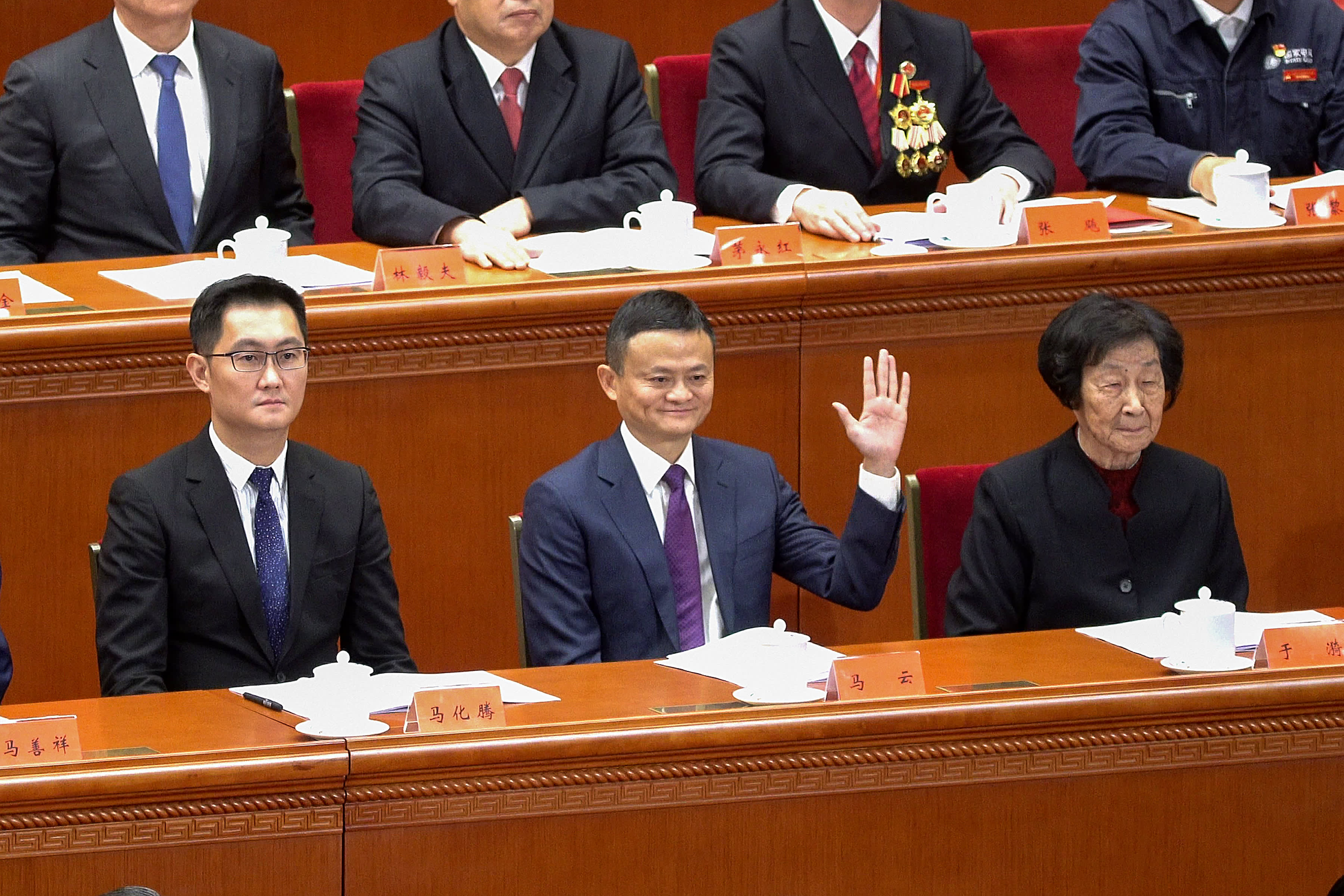
Tencent Holdings' CEO Pony Ma and Alibaba's founder Jack Ma attend a grand gathering to celebrate the 40th anniversary of China's reform and opening-up at the Great Hall of the People on December 18, 2018 in Beijing, China.
Xiong Yong | Visual China Group | Getty Images
As Chinese tech juggernauts Alibaba and Tencent navigate the challenging test of rising tensions between Beijing and Washington, one analyst says the former is the better stock to own.
"Right now, I think Alibaba will probably be the better stock because it has much better growth than Tencent," Leo Sun, technology and consumer goods specialist at The Motley Fool, told CNBC's "Street Signs" on Thursday.
"It might be better to stick with Alibaba for now just because ... its growth accelerated from the previous quarter instead of actually slowing down," said Sun, who said he personally owns Tencent stock.
His comments came after the two internet giants released financial results that beat expectations on Wednesday.
Alibaba's revenue rose to 93.50 billion yuan ($13.59 billion) for the three months that ended on March 31, beating estimates of 91.58 billion yuan, according to IBES data from Refinitiv.
"I would say that Alibaba has reported a very strong set of results," David Dai, senior analyst at Bernstein, told CNBC's "Squawk Box" on Thursday.
"If you look at the core business, it has delivered significant growth," Dai said. "In fact, it was a re-acceleration from the previous quarter, which was very strong given the backdrop of a slowing China economy."
With e-commerce penetration in China currently at 19%, he added, there is "still a lot of room to grow further" and Alibaba is likely to be the "biggest beneficiary" as online shopping spreads.
Alibaba makes money primarily by selling advertising and promotional services to third-party merchants that list products on Taobao and Tmall, two of its e-commerce sites.
For its part, Tencent also posted a record quarterly profit, though revenue grew at its slowest-ever pace.
A gaming powerhouse, Tencent was hit hard for the bulk of 2018 due to a freeze in video game approvals by China's internet regulator. That led the company to its sharpest-ever profit drop in the three months through December, and the slowest annual profit growth in 13 years.
Game approvals restarted in December, with Tencent receiving permission to launch major title "Perfect World Mobile" in the January-March quarter.
Earlier this month, the company also stopped its trial version of the popular "PlayerUnknown's Battlegrounds" (PUBG) in China, in favor of the anti-terrorism-themed "Game for Peace" — a title Sun said was "produced at the guidance of China's military recruitment unit."
The move came afterTencent struggled to gain approval to sell in-app purchases for PUBG, for which "Game for Peace" got the green light in April.
"'Game of Peace' generated $50 million revenue within the first 72 hours of its launch, and it could offset the ongoing decline in 'Honor of Kings,' which lost 12% of its monthly active players in March," Sun said, referring to Tencent's other major gaming title.
"Right now, the focus will probably be on whether or not (Tencent's) revenue can accelerate again," he said.
Trade war impact
Both analysts agreed that the general global environment was weighing on shares of Alibaba and Tencent, leaving them to look domestically for growth.
"Under the backdrop of global tension, what the Chinese internet companies have, as we have seen in (Alibaba) and in Tencent, is focused on ... the domestic consumption and focused on China's transition into the consumption economy to drive growth for all the companies," Bernstein's Dai said.
Sun agreed, saying that Chinese stocks in general were currently "weighed down" by conflicts such as the trade war between Washington and Beijing as well as "macro weakness" in the Chinese economy.
"You're going to see that, if the macro continues to slowdown, that is going to impact the people's consumption ... in the short term," Dai said. "That is almost inevitable, but the long term ... for the internet companies, I would say is much more important."
— Reuters contributed to this report.
via IFTTT
No comments:
Post a Comment